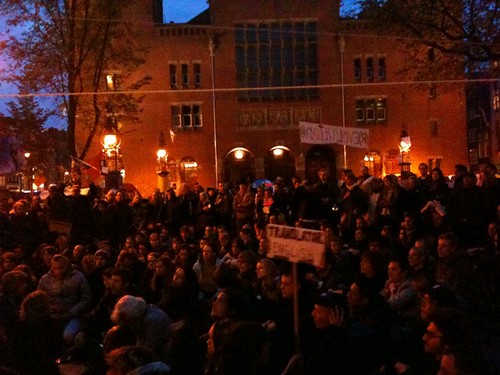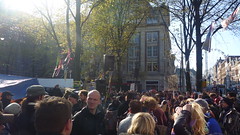 Occupy Amsterdam has just entered into its 3rd week. 3 weeks of building a community where people have come together and occupied a public space, where debates are an almost 24 hour phenomenon and cooperation is currency.
Occupy Amsterdam has just entered into its 3rd week. 3 weeks of building a community where people have come together and occupied a public space, where debates are an almost 24 hour phenomenon and cooperation is currency.
Over the first 7 days of occupyamsterdam I was there checking in with people and observing how things developed. During those days I observed meetings of the General Assembly, as well as work groups that are dedicated to different aspects of the movement. I observed teach-ins or education lectures. At the weekend I listened to and even participated in speeches and musical performances. By the beginning of week two it had become a fully functional camp where some people could live and anyone can and did stop by to participate or look around.
The following 4 interviews are taken from week 1, they were carried out with people I saw regularly participating and attending events. My goal in these conversations was not to do what the mainstream media does: asking people why they are here as if I don’t understand. Instead, my goal was to hear about the details of how the movement functions and how it deals with a dysfunctional press that is unlikely to communicate their message with much accuracy. Of course during these interviews opinions, experiences, and statements lead to a number of topics popping up beyond how occupyamsterdam functions. We also get into the feeling or spirit of occupy, the outside perception and challenge the group faces when it comes to being understood and heard, and of course the lesser known facts about how the banking system has impacted the very core of how nations function and how people live.
Lastly you’ll hear from legendary musician and activist Michael Franti.. as he walked right by me and climbed on stage to give a surprise performance and words of support for the occupy movement.
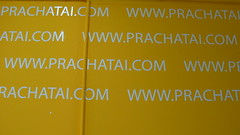 It was the summer of 2008 and I was in Bangkok, Thailand, on a then work related trip that left me enough spare time to look around and do some reporting. My focus included alternative media, and lucky for me, a good friend introduced me to Jiew, editor of the alternative magazine Prachatai.com. We did a very
It was the summer of 2008 and I was in Bangkok, Thailand, on a then work related trip that left me enough spare time to look around and do some reporting. My focus included alternative media, and lucky for me, a good friend introduced me to Jiew, editor of the alternative magazine Prachatai.com. We did a very 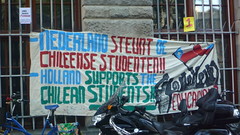 My guest on this edition of Citizenreporter.org is Chilean-American, community organizer, world citizen
My guest on this edition of Citizenreporter.org is Chilean-American, community organizer, world citizen 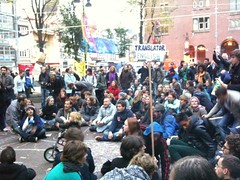 Two minutes captured during a General Assembly meeting on Monday the 17th of October.
Two minutes captured during a General Assembly meeting on Monday the 17th of October.